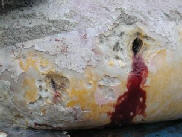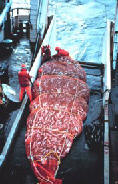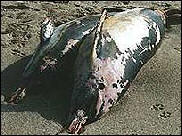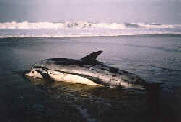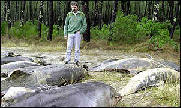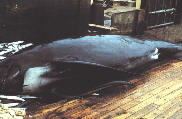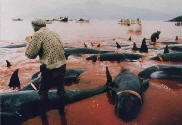EUROPEAN CETACEAN BYCATCH CAMPAIGN
"Man is but a strand in the complex web of life"
"Man is but a strand in the complex web of life"
In February 1989: 600 dolphins stranded in two days in Landes and Vendee, on the French Atlantic coast.
Many of the bodies showed signs of incidental capture in fishing nets.
January -
In 1993, 20 common dolphins stranded in Devon and Cornwall.
In 1996, 30 common dolphins stranded in the same two counties. This pattern was mirrored on the coastlines of other European countries.
Pelagic trawling for mackerel and pilchard was identified as the most likely cause of the mass mortality of common dolphins in Devon and Cornwall 1992/1993.
The same fisheries were thought to be responsible for similar strandings of common and white-
Pelagic trawling for herring was thought to be responsible for harbour porpoise strandings off the southern Irish coast.
February -
Many of the bodies showed signs of incidental capture in trawl nets.
February -
During the same period, French and UK pair trawlers, were fishing for sea bass in the Western Approaches.
.
Prior to 2000, 2-3 cetaceans stranded on the beaches of Jersey and Guernsey.
In 2000, 12 cetaceans, principally common dolphins, stranded on the beaches of Jersey.
In 2000, 24 dolphins stranded on the beaches of Guernsey.
In 2001, similar numbers stranded on the beaches of Jersey and Guernsey.
January – March 2001: Government figures show there was a 66% increase in the number of common dolphins, which stranded on the beaches of Cornwall. 94.44% of those post – mortemed were found to have died as a result of bycatch.
One Scottish pair trawler took 20 dolphins in a single hall, and it is reported that a French pair trawler took 50 dolphins in a single haul. However, as there were no observers present on French trawlers, this figure cannot be substantiated.
April – June 2001: Government figures show a significant increase in the number of cetacean strandings, for England and Wales, in comparison with the figures for the same period in 2000, and 1999.
In 2001, the number of cetaceans which stranded on the beaches of Cornwall was the second highest on record, the highest being in 1992.
January 1st – February 5th 2002: 109 cetaceans, principally common dolphins, stranded on the beaches of southern England.
350 dolphins stranded on the beaches of France, during the same period.
A further 150 dolphins stranded on one French beach, in 2 days.
January - April 2002 : in excess of 1000 dolphins, the vast majority being common dolphins, were found on the beaches of southern England and western France.
Many of the animals that were found, displayed puncture wounds, made by fishermen in an attempt to make the bodies sink.
Many also were missing their heads or tail flukes, which we understand happens when fishermen remove the animals from the net or fish pump.
Post - mortem results have shown that some animals had been punctured whilst still alive.
Many dolphins die as a result of entanglement in purse seine nets, longlines, and other types of trawlers. However, there has been little research in European waters regarding these fishing methods, but evidence form the US, New Zealand and Australia suggests this to be the case.
Pilot Whales
There has been an alarming increase in the number of stranded pilot whales.
During the first three months of this year, there were numerous and substantiated reports of dead pilot whales floating in the seas off the south of England, Jersey, Guernsey, Ireland and France.
2 decomposed pilot whales were found in the net of a Cornish bottom trawler when it was hauled.
As mentioned earlier, 8 pilot whales were taken by 4 pairs of Irish pair trawlers.
2000 pilot whales are killed each year by the people of the Faeroe Islands, in an extremely cruel event called “The Grind”.
Top
.
Prior to 2000, 2-
In 2000, 12 cetaceans, principally common dolphins, stranded on the beaches of Jersey.
In 2000, 24 dolphins stranded on the beaches of Guernsey.
In 2001, similar numbers stranded on the beaches of Jersey and Guernsey.
January – March 2001: Government figures show there was a 66% increase in the number of common dolphins, which stranded on the beaches of Cornwall. 94.44% of those post – mortemed were found to have died as a result of bycatch.
One Scottish pair trawler took 20 dolphins in a single hall, and it is reported that a French pair trawler took 50 dolphins in a single haul. However, as there were no observers present on French trawlers, this figure cannot be substantiated.
April – June 2001: Government figures show a significant increase in the number of cetacean strandings, for England and Wales, in comparison with the figures for the same period in 2000, and 1999.
In 2001, the number of cetaceans which stranded on the beaches of Cornwall was the second highest on record, the highest being in 1992.
January 1st – February 5th 2002: 109 cetaceans, principally common dolphins, stranded on the beaches of southern England.
350 dolphins stranded on the beaches of France, during the same period.
A further 150 dolphins stranded on one French beach, in 2 days.
January -
Many of the animals that were found, displayed puncture wounds, made by fishermen in an attempt to make the bodies sink.
Many also were missing their heads or tail flukes, which we understand happens when fishermen remove the animals from the net or fish pump.
Post -
Many dolphins die as a result of entanglement in purse seine nets, longlines, and other types of trawlers. However, there has been little research in European waters regarding these fishing methods, but evidence form the US, New Zealand and Australia suggests this to be the case.
Pilot Whales
There has been an alarming increase in the number of stranded pilot whales.
During the first three months of this year, there were numerous and substantiated reports of dead pilot whales floating in the seas off the south of England, Jersey, Guernsey, Ireland and France.
2 decomposed pilot whales were found in the net of a Cornish bottom trawler when it was hauled.
As mentioned earlier, 8 pilot whales were taken by 4 pairs of Irish pair trawlers.
2000 pilot whales are killed each year by the people of the Faeroe Islands, in an extremely cruel event called “The Grind”.
Top
